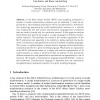Free Online Productivity Tools
i2Speak
i2Symbol
i2OCR
iTex2Img
iWeb2Print
iWeb2Shot
i2Type
iPdf2Split
iPdf2Merge
i2Bopomofo
i2Arabic
i2Style
i2Image
i2PDF
iLatex2Rtf
Sci2ools
MDAFA
2004
Springer
2004
Springer
MISTRAL: A Language for Model Transformations in the MOF Meta-modeling Architecture
In the Meta Object Facility (MOF) meta-modeling architecture a number of model transformation scenarios can be identified. It could be expected that a meta-modeling architecture will be accompanied by a transformation technology supporting the model transformation scenarios in a uniform way. Despite the fact that current transformation languages have similarities they are usually focused only on a particular scenario. In this paper we analyze the problems that prevent the usage of a single language for different transformation scenarios. The problems are rooted in the current organization of the MOF architecture and especially in its inability to define explicitly the mechanisms of instantiation and generalization found in different modeling languages. This causes a coupling between a transformation language and the instantiation mechanism specific for a given modeling language. We propose an organization of the MOF architecture based on a simple and uniform representation of all model...
Hardware | MDAFA 2004 | Model Transformation Scenarios | Transformation Language | Transformation Scenarios |
| Added | 02 Jul 2010 |
| Updated | 02 Jul 2010 |
| Type | Conference |
| Year | 2004 |
| Where | MDAFA |
| Authors | Ivan Kurtev, Klaas van den Berg |
Comments (0)

